| Listing 1 - 7 of 7 |
Sort by
|

ISBN: 1402013302 1402013310 9400708122 9781402013300 9781402013317 Year: 2003 Volume: 19 Publisher: Dordrecht: Kluwer academic,
Abstract | Keywords | Export | Availability | Bookmark
 Loading...
Loading...Choose an application
- Reference Manager
- EndNote
- RefWorks (Direct export to RefWorks)
Since its birth, Model Theory has been developing a number of methods and concepts that have their intrinsic relevance, but also provide fruitful and notable applications in various fields of Mathematics. It is a lively and fertile research area which deserves the attention of the mathematical world. This volume: -is easily accessible to young people and mathematicians unfamiliar with logic; -gives a terse historical picture of Model Theory; -introduces the latest developments in the area; -provides 'hands-on' proofs of elimination of quantifiers, elimination of imaginaries and other relevant matters. A Guide to Classical and Modern Model Theory is for trainees and professional model theorists, mathematicians working in Algebra and Geometry and young people with a basic knowledge of logic.
Model theory --- Model theory. --- Logic. --- Mathematical logic. --- Algebra. --- Mathematical Logic and Foundations. --- Mathematics --- Mathematical analysis --- Algebra of logic --- Logic, Universal --- Mathematical logic --- Symbolic and mathematical logic --- Symbolic logic --- Algebra, Abstract --- Metamathematics --- Set theory --- Syllogism --- Argumentation --- Deduction (Logic) --- Deductive logic --- Dialectic (Logic) --- Logic, Deductive --- Intellect --- Philosophy --- Psychology --- Science --- Reasoning --- Thought and thinking --- Methodology
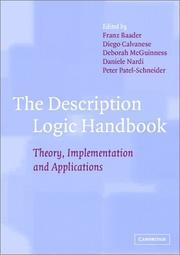
ISBN: 0521781760 9780521781763 Year: 2003 Publisher: Cambridge: Cambridge university press,
Abstract | Keywords | Export | Availability | Bookmark
 Loading...
Loading...Choose an application
- Reference Manager
- EndNote
- RefWorks (Direct export to RefWorks)
681.3*F41 Mathematical logic: computability theory; computational logic; lambda calculus; logic programming; mechanical theorem proving; model theory; proof theory;recursive function theory--See also {681.3*F11}; {681.3*I22}; {681.3*I23} --- Mathematical logic: computability theory; computational logic; lambda calculus; logic programming; mechanical theorem proving; model theory; proof theory;recursive function theory--See also {681.3*F11}; {681.3*I22}; {681.3*I23} --- Description logics --- 681.3*F41 --- Logics, Description --- Knowledge representation (Information theory) --- Predicate (Logic) --- Handbooks, manuals, etc. --- Description logics - Handbooks, manuals, etc.
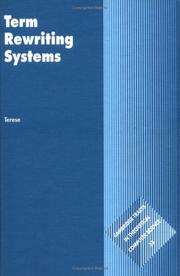
ISBN: 0521391156 9780521391153 Year: 2003 Publisher: New York, N.Y. Cambridge University Press
Abstract | Keywords | Export | Availability | Bookmark
 Loading...
Loading...Choose an application
- Reference Manager
- EndNote
- RefWorks (Direct export to RefWorks)
Computer science --- 681.3*F11 --- 681.3*F42 --- 681.3*F41 --- 681.3*I22 --- 681.3*D31 --- Models of computation: automata; bounded action devices; computability theory; relations among models; self-modifying machines; unbounded-action devices--See also {681.3*F41} --- Grammars and other rewriting systems: decision problems; grammar types; parallel rewriting systems; parsing; thue systems (Mathematical logic and formal languages)--See also {681.3*D31} --- Mathematical logic: computability theory; computational logic; lambda calculus; logic programming; mechanical theorem proving; model theory; proof theory;recursive function theory--See also {681.3*F11}; {681.3*I22}; {681.3*I23} --- Automatic programming: automatic analysis of algorithms; program modification; program synthesis; program transformation; program verification (Artificialintelligence)--See also {681.3*D12}; {681.3*F31} --- Formal definitions and theory: semantics; syntax (Programming languages)--See also {681.3*D21}; {681.3*F31}; {681.3*F32}; {681.3*F42}; {681.3*F43} --- Rewriting systems (Computer science) --- Rewriting systems (Computer science). --- 681.3*D31 Formal definitions and theory: semantics; syntax (Programming languages)--See also {681.3*D21}; {681.3*F31}; {681.3*F32}; {681.3*F42}; {681.3*F43} --- 681.3*I22 Automatic programming: automatic analysis of algorithms; program modification; program synthesis; program transformation; program verification (Artificialintelligence)--See also {681.3*D12}; {681.3*F31} --- 681.3*F41 Mathematical logic: computability theory; computational logic; lambda calculus; logic programming; mechanical theorem proving; model theory; proof theory;recursive function theory--See also {681.3*F11}; {681.3*I22}; {681.3*I23} --- 681.3*F42 Grammars and other rewriting systems: decision problems; grammar types; parallel rewriting systems; parsing; thue systems (Mathematical logic and formal languages)--See also {681.3*D31} --- 681.3*F11 Models of computation: automata; bounded action devices; computability theory; relations among models; self-modifying machines; unbounded-action devices--See also {681.3*F41} --- Graph rewriting systems (Computer science) --- Term rewriting systems (Computer science) --- Machine theory
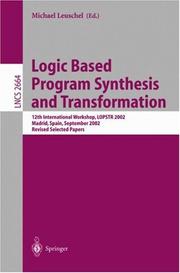
ISBN: 3540404384 3540450130 Year: 2003 Publisher: Berlin, Heidelberg : Springer Berlin Heidelberg : Imprint: Springer,
Abstract | Keywords | Export | Availability | Bookmark
 Loading...
Loading...Choose an application
- Reference Manager
- EndNote
- RefWorks (Direct export to RefWorks)
This book constitutes the thoroughly refereed post-proceedings of the 12th International Workshop on Logic Based Program Synthesis and Transformation, LOPSTR 2002, held in Madrid, Spain in September 2002. The 15 revised full papers presented together with 7 abstracts were carefully selected during two rounds of reviewing and revision from 40 submissions. The papers are organized in topical sections on debugging and types, tabling and constraints, abstract interpretation, program refinement, verification, partial evaluation, and rewriting and object-oriented development.
Logic programming --- Computer Science --- Engineering & Applied Sciences --- 681.3*D16 --- 681.3*D11 --- 681.3*F31 --- 681.3*F41 --- 681.3*I22 --- Computerwetenschap--?*D16 --- Applicative (functional) programming --- Specifying anf verifying and reasoning about programs: assertions; invariants; mechanical verification; pre- and post-conditions (Logics and meanings of programs)--See also {681.3*D21}; {681.3*D24}; {681.3*D31}; {681.3*E1} --- Mathematical logic: computability theory; computational logic; lambda calculus; logic programming; mechanical theorem proving; model theory; proof theory;recursive function theory--See also {681.3*F11}; {681.3*I22}; {681.3*I23} --- Automatic programming: automatic analysis of algorithms; program modification; program synthesis; program transformation; program verification (Artificialintelligence)--See also {681.3*D12}; {681.3*F31} --- 681.3*I22 Automatic programming: automatic analysis of algorithms; program modification; program synthesis; program transformation; program verification (Artificialintelligence)--See also {681.3*D12}; {681.3*F31} --- 681.3*F41 Mathematical logic: computability theory; computational logic; lambda calculus; logic programming; mechanical theorem proving; model theory; proof theory;recursive function theory--See also {681.3*F11}; {681.3*I22}; {681.3*I23} --- 681.3*F31 Specifying anf verifying and reasoning about programs: assertions; invariants; mechanical verification; pre- and post-conditions (Logics and meanings of programs)--See also {681.3*D21}; {681.3*D24}; {681.3*D31}; {681.3*E1} --- 681.3*D11 Applicative (functional) programming --- Computer science. --- Science. --- Computer programming. --- Computer logic. --- Mathematical logic. --- Computer Science. --- Logics and Meanings of Programs. --- Science, general. --- Programming Techniques. --- Mathematical Logic and Formal Languages. --- Algebra of logic --- Logic, Universal --- Mathematical logic --- Symbolic and mathematical logic --- Symbolic logic --- Mathematics --- Algebra, Abstract --- Metamathematics --- Set theory --- Syllogism --- Computer science logic --- Logic, Symbolic and mathematical --- Computers --- Electronic computer programming --- Electronic data processing --- Electronic digital computers --- Programming (Electronic computers) --- Coding theory --- Natural science --- Science of science --- Sciences --- Informatics --- Science --- Programming --- Logic design. --- Science, Humanities and Social Sciences, multidisciplinary. --- Design, Logic --- Design of logic systems --- Digital electronics --- Electronic circuit design --- Logic circuits --- Machine theory --- Switching theory --- Logic, Symbolic and mathematical.
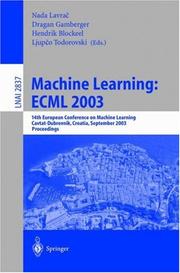
ISBN: 3540201211 3540398570 Year: 2003 Publisher: Berlin, Heidelberg : Springer Berlin Heidelberg : Imprint: Springer,
Abstract | Keywords | Export | Availability | Bookmark
 Loading...
Loading...Choose an application
- Reference Manager
- EndNote
- RefWorks (Direct export to RefWorks)
The proceedings of ECML/PKDD2003 are published in two volumes: the P- ceedings of the 14th European Conference on Machine Learning (LNAI 2837) and the Proceedings of the 7th European Conference on Principles and Practice of Knowledge Discovery in Databases (LNAI 2838). The two conferences were held on September 22–26, 2003 in Cavtat, a small tourist town in the vicinity of Dubrovnik, Croatia. As machine learning and knowledge discovery are two highly related ?elds, theco-locationofbothconferencesisbene?cialforbothresearchcommunities.In Cavtat, ECML and PKDD were co-located for the third time in a row, following the successful co-location of the two European conferences in Freiburg (2001) and Helsinki (2002). The co-location of ECML2003 and PKDD2003 resulted in a joint program for the two conferences, including paper presentations, invited talks, tutorials, and workshops. Out of 332 submitted papers, 40 were accepted for publication in the ECML2003proceedings,and40wereacceptedforpublicationinthePKDD2003 proceedings. All the submitted papers were reviewed by three referees. In ad- tion to submitted papers, the conference program consisted of four invited talks, four tutorials, seven workshops, two tutorials combined with a workshop, and a discovery challenge.
681.3*I2 <063> --- 681.3*F22 <063> --- 681.3*F41 <063> --- 681.3*H28 <063> --- 681.3*I2 <063> Artificial intelligence. AI--Congressen --- Artificial intelligence. AI--Congressen --- Nonnumerical algorithms and problems: complexity of proof procedures computations on discrete structures geometrical problems and computations pattern matching --See also {?681.3*E2-5} {681.3*G2} {?681.3*H2-3}--Congressen --- Mathematical logic: computability theory computational logic lambda calculus logic programming mechanical theorem proving model theory proof theoryrecursive function theory--See also {681.3*F11} {681.3*I22} {681.3*I23}--Congressen --- Database applications--Congressen --- Conferences - Meetings --- Machine learning --- Computer science. --- Algorithms. --- Mathematical logic. --- Artificial intelligence. --- Computer Science. --- Artificial Intelligence (incl. Robotics). --- Algorithm Analysis and Problem Complexity. --- Mathematical Logic and Formal Languages. --- Nonnumerical algorithms and problems: complexity of proof procedures; computations on discrete structures; geometrical problems and computations; pattern matching --See also {?681.3*E2-5}; {681.3*G2}; {?681.3*H2-3}--Congressen --- Mathematical logic: computability theory; computational logic; lambda calculus; logic programming; mechanical theorem proving; model theory; proof theory;recursive function theory--See also {681.3*F11}; {681.3*I22}; {681.3*I23}--Congressen --- AI (Artificial intelligence) --- Artificial thinking --- Electronic brains --- Intellectronics --- Intelligence, Artificial --- Intelligent machines --- Machine intelligence --- Thinking, Artificial --- Bionics --- Cognitive science --- Digital computer simulation --- Electronic data processing --- Logic machines --- Machine theory --- Self-organizing systems --- Simulation methods --- Fifth generation computers --- Neural computers --- Algebra of logic --- Logic, Universal --- Mathematical logic --- Symbolic and mathematical logic --- Symbolic logic --- Mathematics --- Algebra, Abstract --- Metamathematics --- Set theory --- Syllogism --- Algorism --- Algebra --- Arithmetic --- Informatics --- Science --- Foundations --- Computer software. --- Artificial Intelligence. --- Software, Computer --- Computer systems --- Logic, Symbolic and mathematical.
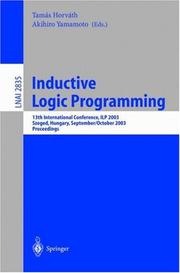
ISBN: 3540201440 3540399178 Year: 2003 Publisher: Berlin, Heidelberg : Springer Berlin Heidelberg : Imprint: Springer,
Abstract | Keywords | Export | Availability | Bookmark
 Loading...
Loading...Choose an application
- Reference Manager
- EndNote
- RefWorks (Direct export to RefWorks)
681.3*D16 --- Logic programming --- 681.3*I26 --- 681.3*I23 <063> --- 681.3*F41 <63> --- Computer programming --- 681.3*I23 <063> Deduction and theorem proving: answer/reason extraction reasoning resolution metatheory mathematical induction logic programming (Artificial intelligence)--Congressen --- Deduction and theorem proving: answer/reason extraction reasoning resolution metatheory mathematical induction logic programming (Artificial intelligence)--Congressen --- 681.3*I26 Learning: analogies concept learning induction knowledge acquisition language acquisition parameter learning (Artificial intelligence)--See also {681.3*K32} --- Learning: analogies concept learning induction knowledge acquisition language acquisition parameter learning (Artificial intelligence)--See also {681.3*K32} --- Computerwetenschap--?*D16 --- Mathematical logic: computability theory computational logic lambda calculus logic programming mechanical theorem proving model theory proof theoryrecursive function theory--See also {681.3*F11} {681.3*I22} {681.3*I23}--Congressen --- Computer science. --- Software engineering. --- Computer programming. --- Mathematical logic. --- Artificial intelligence. --- Computer Science. --- Software Engineering/Programming and Operating Systems. --- Artificial Intelligence (incl. Robotics). --- Computer Science, general. --- Programming Techniques. --- Mathematical Logic and Formal Languages. --- AI (Artificial intelligence) --- Artificial thinking --- Electronic brains --- Intellectronics --- Intelligence, Artificial --- Intelligent machines --- Machine intelligence --- Thinking, Artificial --- Bionics --- Cognitive science --- Digital computer simulation --- Electronic data processing --- Logic machines --- Machine theory --- Self-organizing systems --- Simulation methods --- Fifth generation computers --- Neural computers --- Algebra of logic --- Logic, Universal --- Mathematical logic --- Symbolic and mathematical logic --- Symbolic logic --- Mathematics --- Algebra, Abstract --- Metamathematics --- Set theory --- Syllogism --- Computers --- Electronic computer programming --- Electronic digital computers --- Programming (Electronic computers) --- Coding theory --- Computer software engineering --- Engineering --- Informatics --- Science --- Programming --- 681.3*I23 <063> Deduction and theorem proving: answer/reason extraction; reasoning; resolution; metatheory; mathematical induction; logic programming (Artificial intelligence)--Congressen --- Deduction and theorem proving: answer/reason extraction; reasoning; resolution; metatheory; mathematical induction; logic programming (Artificial intelligence)--Congressen --- 681.3*I26 Learning: analogies; concept learning; induction; knowledge acquisition; language acquisition; parameter learning (Artificial intelligence)--See also {681.3*K32} --- Learning: analogies; concept learning; induction; knowledge acquisition; language acquisition; parameter learning (Artificial intelligence)--See also {681.3*K32} --- Mathematical logic: computability theory; computational logic; lambda calculus; logic programming; mechanical theorem proving; model theory; proof theory;recursive function theory--See also {681.3*F11}; {681.3*I22}; {681.3*I23}--Congressen --- Artificial Intelligence. --- Logic, Symbolic and mathematical.
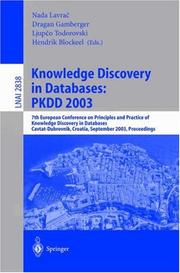
ISBN: 3540200851 354039804X Year: 2003 Publisher: Berlin, Heidelberg : Springer Berlin Heidelberg : Imprint: Springer,
Abstract | Keywords | Export | Availability | Bookmark
 Loading...
Loading...Choose an application
- Reference Manager
- EndNote
- RefWorks (Direct export to RefWorks)
The proceedings of ECML/PKDD2003 are published in two volumes: the P- ceedings of the 14th European Conference on Machine Learning (LNAI 2837) and the Proceedings of the 7th European Conference on Principles and Practice of Knowledge Discovery in Databases (LNAI 2838). The two conferences were held on September 22–26, 2003 in Cavtat, a small tourist town in the vicinity of Dubrovnik, Croatia. As machine learning and knowledge discovery are two highly related ?elds, theco-locationofbothconferencesisbene?cialforbothresearchcommunities.In Cavtat, ECML and PKDD were co-located for the third time in a row, following the successful co-location of the two European conferences in Freiburg (2001) and Helsinki (2002). The co-location of ECML2003 and PKDD2003 resulted in a joint program for the two conferences, including paper presentations, invited talks, tutorials, and workshops. Out of 332 submitted papers, 40 were accepted for publication in the ECML2003proceedings,and40wereacceptedforpublicationinthePKDD2003 proceedings. All the submitted papers were reviewed by three referees. In ad- tion to submitted papers, the conference program consisted of four invited talks, four tutorials, seven workshops, two tutorials combined with a workshop, and a discovery challenge.
681.3*I26 <063> --- 681.3*H2 <063> --- 681.3*J1 --- 681.3*J2 <063> --- 681.3*H3 <063> --- 681.3*G3 <063> --- 681.3*I7 <063> --- 681.3*F42 <063> --- 681.3*F41 <063> --- 681.3*J1 Administrative data processing (Computer applications) --- Administrative data processing (Computer applications) --- 681.3*J2 <063> Physical sciences and engineering (Computer applications)--Congressen --- Physical sciences and engineering (Computer applications)--Congressen --- 681.3*I26 <063> Learning: analogies concept learning induction knowledge acquisition language acquisition parameter learning (Artificial intelligence)--See also {681.3*K32}--Congressen --- Learning: analogies concept learning induction knowledge acquisition language acquisition parameter learning (Artificial intelligence)--See also {681.3*K32}--Congressen --- Database management: security integrity protection--See also {?681.5*E5}--Congressen --- Information storage and retrieval--Congressen --- Probability and statistics: probabilistic algorithms (including Monte Carlo)random number generation statistical computing statistical software (Mathematics of computing)--Congressen --- Text processing (Computing methodologies)--See also {681.3*H4}--Congressen --- Grammars and other rewriting systems: decision problems grammar types parallel rewriting systems parsing thue systems (Mathematical logic and formal languages)--See also {681.3*D31}--Congressen --- Mathematical logic: computability theory computational logic lambda calculus logic programming mechanical theorem proving model theory proof theoryrecursive function theory--See also {681.3*F11} {681.3*I22} {681.3*I23}--Congressen --- Data mining --- Database searching --- Computer science. --- Data structures (Computer science). --- Mathematical logic. --- Mathematical statistics. --- Database management. --- Information storage and retrieval. --- Artificial intelligence. --- Computer Science. --- Data Structures, Cryptology and Information Theory. --- Artificial Intelligence (incl. Robotics). --- Mathematical Logic and Formal Languages. --- Probability and Statistics in Computer Science. --- Database Management. --- Information Storage and Retrieval. --- 681.3*I26 <063> Learning: analogies; concept learning; induction; knowledge acquisition; language acquisition; parameter learning (Artificial intelligence)--See also {681.3*K32}--Congressen --- Learning: analogies; concept learning; induction; knowledge acquisition; language acquisition; parameter learning (Artificial intelligence)--See also {681.3*K32}--Congressen --- Mathematical logic: computability theory; computational logic; lambda calculus; logic programming; mechanical theorem proving; model theory; proof theory;recursive function theory--See also {681.3*F11}; {681.3*I22}; {681.3*I23}--Congressen --- Grammars and other rewriting systems: decision problems; grammar types; parallel rewriting systems; parsing; thue systems (Mathematical logic and formal languages)--See also {681.3*D31}--Congressen --- Probability and statistics: probabilistic algorithms (including Monte Carlo);random number generation; statistical computing; statistical software (Mathematics of computing)--Congressen --- Database management: security; integrity; protection--See also {?681.5*E5}--Congressen --- AI (Artificial intelligence) --- Artificial thinking --- Electronic brains --- Intellectronics --- Intelligence, Artificial --- Intelligent machines --- Machine intelligence --- Thinking, Artificial --- Bionics --- Cognitive science --- Digital computer simulation --- Electronic data processing --- Logic machines --- Machine theory --- Self-organizing systems --- Simulation methods --- Fifth generation computers --- Neural computers --- Data base management --- Data services (Database management) --- Database management services --- DBMS (Computer science) --- Generalized data management systems --- Services, Database management --- Systems, Database management --- Systems, Generalized database management --- Mathematics --- Statistical inference --- Statistics, Mathematical --- Statistics --- Probabilities --- Sampling (Statistics) --- Algebra of logic --- Logic, Universal --- Mathematical logic --- Symbolic and mathematical logic --- Symbolic logic --- Algebra, Abstract --- Metamathematics --- Set theory --- Syllogism --- Information structures (Computer science) --- Structures, Data (Computer science) --- Structures, Information (Computer science) --- File organization (Computer science) --- Abstract data types (Computer science) --- Informatics --- Science --- Statistical methods --- Data structures (Computer scienc. --- Information storage and retrieva. --- Data Structures and Information Theory. --- Artificial Intelligence. --- Information storage and retrieval systems. --- Automatic data storage --- Automatic information retrieval --- Automation in documentation --- Computer-based information systems --- Data processing systems --- Data storage and retrieval systems --- Discovery systems, Information --- Information discovery systems --- Information processing systems --- Information retrieval systems --- Machine data storage and retrieval --- Mechanized information storage and retrieval systems --- Computer systems --- Electronic information resources --- Data libraries --- Digital libraries --- Information organization --- Information retrieval
| Listing 1 - 7 of 7 |
Sort by
|

 Search
Search Feedback
Feedback About UniCat
About UniCat  Help
Help News
News